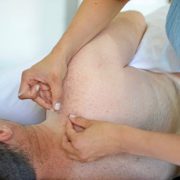How Stress Leads to Back Pain
There is a lot going on in the world right now. And it’s impacting people in different ways. Many folks I speak with have been experiencing a rollercoaster of emotions — and their bodies are reflecting that. It’s resulting in symptoms such as more headaches, tension in their jaw, neck pain, and more back pain. Holding stress in your body is an interesting phenomenon, and there is still a lot of research to be done as to why exactly this happens.
Here are some of the top theories and reasons why stress can increase back pain.
Social conditioning:
Many of us are taught from a young age that expressing emotions, particularly negative emotions, is “bad” or “unacceptable.” The result is that you may have learned to hold stress inside your body when faced with a stressful situation. Researchers who study this believe that the muscle tension we develop is the result of “unspoken social beliefs” that we adopted as children in order to feel accepted or liked. This pattern carries into adulthood and becomes embedded into our subconscious systems, i.e. our nervous system. Later on, when faced with certain types of stress, our muscles react based on how we’ve taught our nervous system to repress (versus express) and immediately tense up. If you grew up learning to bury emotions and tension in your back, you’ll still feel more back pain as an adult whenever you’re stressed.
Trauma:
Trauma is often thought of as one, big physical event that is typically violent. But you can experience less obvious emotional or “micro-traumas” over the years that go unrealized over the course of your life. Then there is accidental trauma, such as a car accident or terrible fall, that was not deliberately afflicted on you. Regardless of the type of trauma or its perceived severity, the point here is that your body reacted in a certain way when you experienced it, and it “remembers.” Sometimes not right away, and sometimes not until years later, but stressful, emotional events such as what is going on in the world right now can trigger your body to react to trauma all over again. This could result in back pain if that is where your body held or experienced the stress at the time of the trauma.
Environmental Stressors and Habits:
This is something we help people with all the time in our office. Your daily physical and postural habits have a huge impact not only in how your body feels from day to day, but in how well it recovers from pain or injury. If you’ve been following us for a while, you know that sitting too much is one of the number one causes of persistent and chronic back pain. And stress plays a role in this. When you’re stressed, you tend to be less motivated and you may opt for unhealthy coping mechanisms, such as more TV and more couch time. You stay home instead of heading out for a walk or to exercise. This type of behavior, often influenced by stress, can exacerbate and even cause back pain.
Regardless of how or why stress impacts your body or your back pain, there is one thing I know for sure: MOVEMENT HELPS.
But what if your back pain has gotten so bad that now you can’t move, even if you want to? Or just the idea of moving and exercising has you fearful that you could worsen your back pain?
The first step is awareness. Is stress truly the main source of your back pain, is it something else, or is it a combination of the two? Knowing why your back actually hurts in the first place is essential for determining the correct intervention. If your back pain is primarily due to stress, and you’re about to undergo back surgery, that surgery won’t help you. Your back pain will just come back the next time you are stressed.
If you’re looking for help with back pain and are wondering whether or not stress could be the reason you’re feeling more of it right now, sign up for a FREE 30 minute Discovery Session with one of our specialists. Many of our clients, after meeting with us for the first time, tell us how relieved they are to find out there is hope for getting rid of their back pain, even if they’ve suffered for years.



